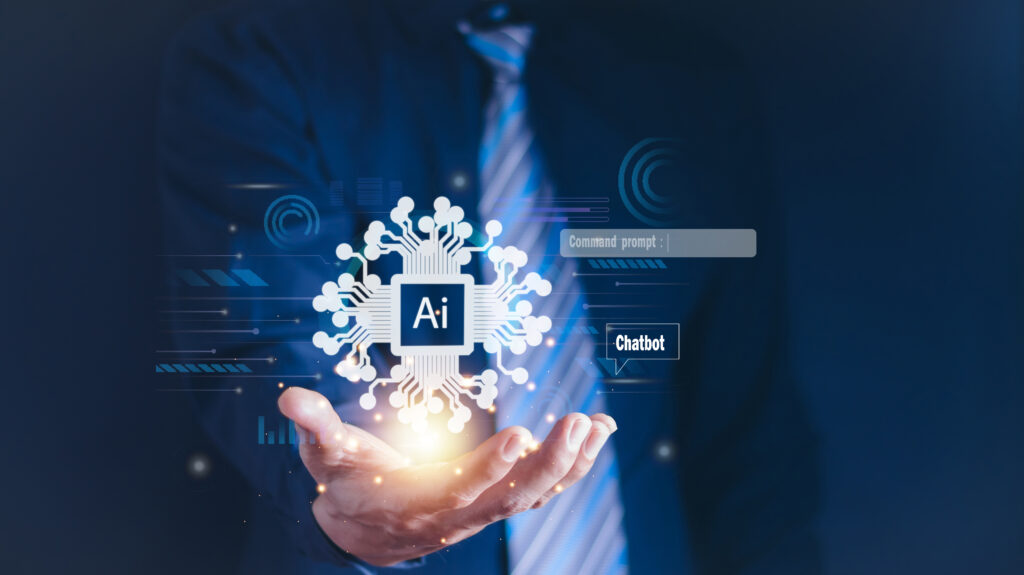Artificial intelligence (AI) is becoming widely used for business purposes. Many companies are integrating artificial intelligence into standard enterprise software systems that manage essential business activities or adopting artificial intelligence as a stand-alone technology for specific use cases.
In this blog post, we explore the transformative potential of AI, highlighting its numerous benefits and diverse applications across various industries.

Benefits of AI in Business
- Improved Customer Service
Artificial intelligence will be able to communicate with clients in real-time and address their questions or issues in a way that seems more natural than any human could ever accomplish. Customers will have a better overall experience, which will keep them returning to your business.
- Lower Operational Costs
AI automation can help you reduce the amount of repetitive work that human employees must perform. This will free your company to concentrate on other growth-oriented areas, like development and innovation.
Through the analysis of data from thousands of articles authored by human authors, certain artificial intelligence systems are even trained to create content. This can save you money on staff salaries, training expenses, and management fees as you won’t need to recruit writers or editors as much.
- Faster Decision Making
Businesses can benefit from using artificial intelligence to make more consistent and accurate decisions.
For instance, your business can forecast the number of customers who will purchase your product by utilizing an AI-powered platform that leverages historical sales data. Alternatively, it can be used to identify which products should be advertised and when. With no more guesswork involved, you can now make smart decisions regarding which products to put into production.
- Easier Revenue and Sales Forecast
Sales and revenue forecasting is a challenging process that involves a variety of inputs from suppliers, workers, and customers. However, that can be made simple with the aid of a tool driven by artificial intelligence.
Based on historical data and the history of your business, your AI system will forecast future events by learning from past occurrences. Additionally, it considers any recent or potential future changes (like new items or pricing adjustments).
As a result, your system can spot trends in your past data and project how much money each product line will bring in over time. This enables you to decide on inventory levels and other facets of running your company with knowledge.
- Better Understanding of Customers
As previously said, artificial intelligence is capable of quickly identifying patterns and trends in massive volumes of data. It can help you determine what your clients require and desire from your business. You can gather consumer data with an AI system, and then utilize those insights to provide tailored suggestions for your audiences.
Consider displaying content that is relevant to what a customer has read or items that complement the item they have just put on their cart. This will enhance the buying encounter, encourage purchases, and create dependable connections with the client.
Applications of AI in Business
- AI-Enabled Products, Services, and Innovations
While businesses are still in the process of realizing the full potential of artificial intelligence, some are already leveraging the technology to fuel innovation and develop new products and services.
Although some of the most well-known instances of artificial intelligence in action are virtual assistants like Amazon Alexa and others, experts claim that businesses in a variety of sectors are utilizing AI to either create new products or enhance existing ones.
- Optimization
Another use case of artificial intelligence that applies to a variety of business sectors and functions is optimization.
Algorithms and modeling can be used by AI-based business apps to transform data into actionable insights on how businesses can optimize a variety of operations and business processes, from labor schedules to production product pricing. Those systems can use data to find bottlenecks and provide optimal implementation solutions.
This can help businesses by automating repetitive processes, which lowers labor costs and improves accuracy.
- Higher Productivity and Efficiency
Increasing productivity and generating more efficiency are the two main reasons businesses are implementing artificial intelligence.
Artificial intelligence can be integrated into a wide range of tasks that currently need human labor and can either completely or partially complete those tasks faster, more precisely, and at a higher volume than a human could.
- Personalized Customer Service, Support, and Experiences
One of the most common enterprise use cases for artificial intelligence is the delivery of personalized consumer services and experiences.
To create a tailored experience, it uses customer identifiers and consolidating signals from several systems to determine the consumer’s identity, characteristics, and motivations.
While artificial intelligence is widely used for this kind of work, businesses could be more efficient. Nowadays, personalization isn’t being done as well as it could be.
5. More Effective Learning and Training
A lot of companies are experimenting with or utilizing intelligent software to enhance the learning process.
Based on each worker’s experience and knowledge, intelligent technologies can be utilized to tailor instructional plans to their learning demands and comprehension levels. This enables businesses to put in place training initiatives that are more successful.
Ready to revolutionize your business with AI? Partner with Value Shore and unlock the full potential of artificial intelligence for your company’s success. Let us navigate the complexities of AI implementation while you focus on driving growth and innovation. Contact us today to embark on your journey!
- AI in IoT: Benefits, Components, and Impact - April 10, 2025
- AI and Low-Code/No-Code: A New Era of Development and Innovation - February 25, 2025
- The Ultimate Guide to AI in IT Support: The Tools, Benefits & Challenges You Must Know - February 11, 2025
